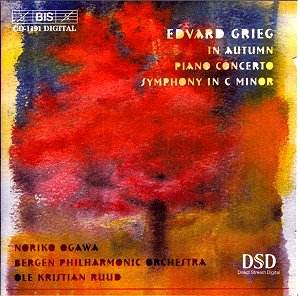This
well filled disc will give buyers immense pleasure. If this particular
repertoire is required the disc is well worth purchasing.
The
recording quality is open and clear and the orchestra is in fine
fettle. Noriko Ogawa, one of BIS’s ‘house’ pianists, has a number
of extremely good recordings to her credit, and this one is no
exception.
Comparison
with the equivalent works, though not similarly coupled, by the
Gothenburg Symphony Orchestra conducted by Neeme Järvi, shows
the older conductor in a very good light. In Gothenburg, there
is more vitality in the playing, although tempi are very similar.
It is all a matter of phrasing and the DG recordings are better
in this respect.
The
Bergen Symphony Orchestra is very good, but their Swedish rivals
are better still. There is not much to worry about in recording
quality as both companies are well known for producing first class
results in these venues.
I
do not know what Grieg would have thought about the number of
recordings there now are of this symphony, performance of which
was originally forbidden by the composer.
This
is a very early work with the influences of middle European structure
and sound patterns clearly in evidence. The symphonic argument
is fairly perfunctory. I do not find much buzz about the progress
of the symphony from start to finish.
When
we get to the Piano Concerto, we are in a quite different situation,
as the Grieg Piano Concerto is one of the cornerstones of romantic
concerto writing. It is perhaps the most popular concerto in the
repertoire. This means that Ogawa is under the severest competition,
with superb and well loved versions by Curzon, Rubinstein, Kovacevich,
Perahia and Andsnes all vying for favoured status. The aforementioned
pianists are just the tip of the iceberg, being the favourite
performances from early vinyl up to CD. In addition to these there
is a myriad of others all jostling for recognition in this market,
and to some extent, this illustrates the problem of the current
record industry. With these pianists, there are at least five
top notch versions before Ogawa even gets a look in. To a large
extent, it will be the couplings which decide upon the final choice.
That
Ogawa can hold her head high in such exalted company is a very
strong plus point, and if you are also looking for a performance
of the Symphony, this is a safe recommendation, without touching
the very summit of interpretations.
The
disc is completed by a lovely performance of In Autumn, an overture
written by the composer whilst he was in Rome. When he returned
to Copenhagen and showed it to Gade, the older composer’s reaction
was that it was "a goddam piece of junk, and that he (Grieg)
should go home and write something better." After recovering
from the comments, the composer completely rewrote the overture
some years later, and has given us a very tuneful piece to complete
this very good disc.
John
Phillips
